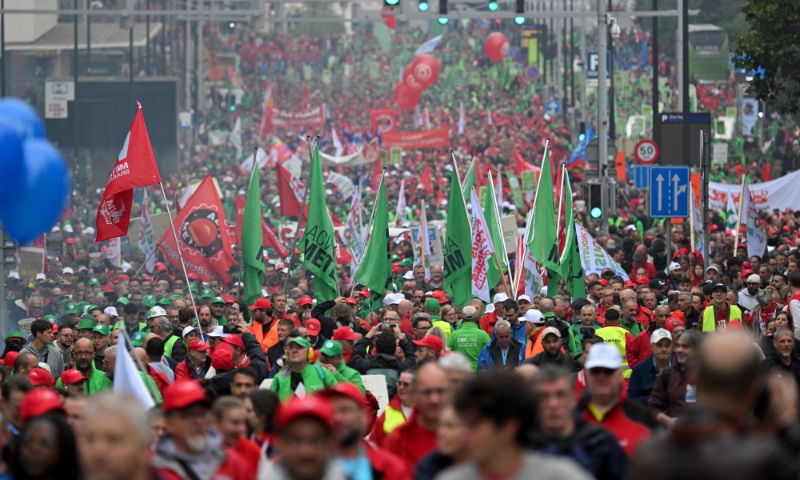BRUSSELS: Thousands of demonstrators took to the streets of Brussels on Monday to show solidarity with workers at a nearby Audi plant facing an uncertain future amid the company’s plans to shut down production.
The protest, participated by more than 5,000 marchers according to police estimates and over 10,000 according to organizers, underscores the broader troubles plaguing Europe’s automotive industry as it grapples with declining sales and increased competition from China.
The Audi factory in Brussels, which currently employs about 3,000 people, is slated to end production in 2025. This decision reflects a wider trend of industry struggles, including diminished demand for electric vehicles (EVs) and rising competition from lower-cost Chinese manufacturers.
The factory, which transitioned to producing EVs in 2018 after 70 years of making combustion engine models, has been hit hard by a drop in sales and high production costs.
“In a few weeks we are going to find ourselves unemployed, with no money and no prospects,” said a 37-year-old worker, who chose to remain anonymous but held a sign reading, “Our lives are not an assembly line.”
The closure announcement by Audi, a subsidiary of Volkswagen, follows recent speculation that Volkswagen might shut down production sites in Germany as part of a major restructuring effort.
The move has intensified concerns within the European automotive sector, which is struggling to adapt to the rapid shift towards electric vehicles and the broader economic challenges facing the industry.
Protesters in Brussels lit firecrackers and smoke bombs, waved trade union flags, and carried signs declaring, “We are not for sale.” The demonstration aimed to pressure European Union leaders into taking significant action to support the industrial sector and safeguard jobs.
The factory’s workers have been on strike since returning from their summer break, with some setting up tents outside the plant in protest.
READ ALSO: BJP’s Efforts to Undermine Muslim Identity in Jammu and Kashmir
The European automotive industry is facing a challenging landscape as it transitions to EVs in response to stringent EU regulations aimed at phasing out fossil fuel-burning cars by 2035. Recent data shows a six percent drop in new car registrations across Europe in July compared to the previous year, partially attributed to the removal of some subsidies.
Additionally, cheaper Chinese vehicles have increasingly penetrated the European market, further exacerbating the difficulties faced by local manufacturers.
Audi had previously cited declining demand for the high-end Q8 e-tron produced in Brussels, coupled with high logistical and production costs, as reasons for the factory’s struggles.
European Union policymakers are considering measures to protect local industries, including proposed import duties of up to 36 percent on EVs from China. However, the proposal has met with resistance from countries such as Spain and Germany, concerned about potential damage to trade relations with Beijing.
European Commission President Ursula von der Leyen has promised to introduce a “Clean Industrial Deal” to boost investment in infrastructure and industry within the first 100 days of her new team taking office later this year. Yet, this support may arrive too late to benefit the Audi workers in Brussels.


























